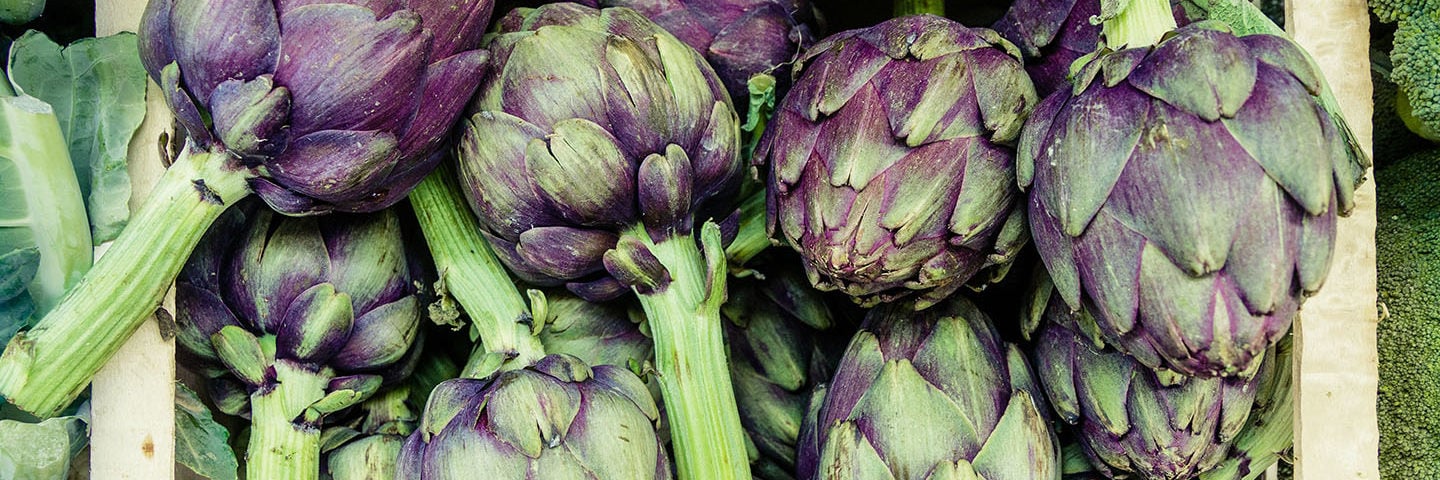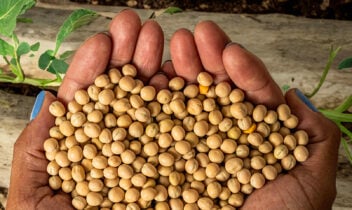
Artichoke
SELECT
Artichokes are available fresh and canned for good nutrition and convenience. If selecting fresh, choose for artichokes that feel heavy and firm. Exterior should have a healthy green color, compact center leaves and an overall look of freshness (not dehydrated).
During the winter months (December to February), artichokes may have a blotchy colored or white-blistered exterior appearance due to colder temperatures and frost. Connoisseurs believe these “Frost-Kissed” artichokes are more tender and have a flavorful, nutty zest.
Varieties to Explore
Jerusalem Artichoke
Nutrient Content Claims
Fat free, Saturated fat free, Cholesterol free, Low in sodium, Good source of vitamin C, Good source of molybdenum, Good source of manganese, Good source of vitamin K, Good source of iron, Good source of zinc, Good source of phosphorous, Good source of potassium, High in magnesium, High in copper, High in fiber
Health Claims
Dietary Fat & Cancer: Development of cancer depends on many factors. A diet low in total fat may reduce the risk of some cancers. Artichokes are fat free.
Sodium & Hypertension:
- Diets low in sodium may reduce the risk of high blood pressure, a disease associated with many factors. Artichokes are low in sodium.
- Diets low in sodium may reduce the risk of high blood pressure. Artichokes are low in sodium.
- Artichokes, as part of a low sodium diet, may reduce the risk of high blood pressure.
Dietary Saturated Fat & Cholesterol & Risk of Coronary Heart Disease: While many factors affect heart disease, diets low in saturated fat and cholesterol may reduce the risk of this disease. Artichokes contain no saturated fat or cholesterol.
Fiber-Containing Grain Products, Fruits, and Vegetables and Cancer: Low fat diets rich in fiber-containing grain products, fruits, and vegetables may reduce the risk of some of cancers, a disease associated with many factors. Artichokes are high in fiber.
Fruits & Vegetables & Cancer: Low fat diets rich in fruits and vegetables (foods that are low in fat and may contain dietary fiber, vitamin A, or vitamin C) may reduce the risk of some types of cancer, a disease associated with many factors. Artichokes are a good source of vitamin C and high in fiber.
STORE
For refrigerated storage, slice a dime width off the artichoke stem, sprinkle with water and refrigerate in an airtight plastic bag. It’s best to cook them within five to seven days after purchase.
Cooked artichokes should be cooled completely and covered before refrigerated, where they can keep for up to a week.
Artichokes are great cooked the night before planned use. Reheat in the oven or microwave before serving, stuffing, grilling or using as an ingredient in another dish or eat chilled with your favorite dipping sauce.
SERVE
Artichoke preparation, cooking and serving
The Top 10 Ways to Enjoy Artichoke
Check out our artichoke recipes!
SAVOR
Presence in Ethnic Cuisines
Mediterranean
SHARE
Social Media Posts
Artichokes are packed with vit C, magnesium, & potassium – did we mention they’re delicious too? @fruitsandveggies #haveaplant
Get a ¼ of the recommended daily fiber you need from eating just one medium artichoke! @fruitsandveggies #haveaplant
Artichokes contain 4 grams of protein, a sizeable amount for a vegetable. @fruitsandveggies #haveaplant
Learn how to remove an artichoke’s fuzzy center – watch this. http://ow.ly/XK7A302w5eT @fruitsandveggies #haveaplant
Easy baked artichokes. Yes! It IS that easy! http://ow.ly/Qvfz302w7gH @fruitsandveggies #haveaplant
Enjoying more fruits and vegetables, inclusive of fresh, frozen, canned, dried and 100% juice, is a delicious way to enjoy a happy, healthy and active lifestyle. @fruitsandveggies #haveaplant

